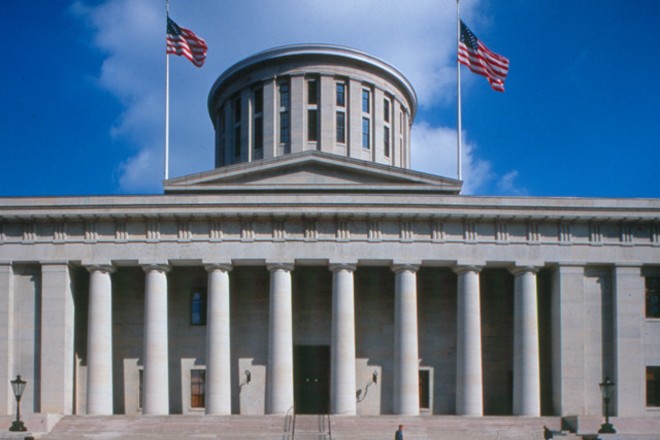The day after Ohio Gov. Mike DeWine used his first State of the State Address to make an impassioned plea for a proposed 18-cent increase to the state's gas tax, Republican lawmakers in the General Assembly signaled they're looking to take another route.
Should they get their way, DeWine's tax boost would be cut almost in half, generating a third less revenue per year, and would be phased in over three years. But the amount of that revenue going to public transit — an area in which Ohio lags nearly every other state in terms of spending per capita — would nearly double over DeWine's proposed expenditure.
Lawmakers say they'd like to pass the smaller gas tax increase — 10.7 cents above the state's current 28-cent tax — along with a 20-cent hike on diesel fuel, a $200 registration fee for electric cars and a $100 fee for hybrids to eventually raise $872 million a year for maintenance on Ohio's deteriorating roads, bridges and highways. The tax hike would be phased in, rising 5 cents in the first year, 3 cents in the second year and 2.7 cents in the final year. The hike would start in October this year. The hike on diesel fuel would also be phased in over three years.
Spending priorities would also be shifted under the plan devised by Republicans in the General Assembly, with $70 million a year going to public transportation. DeWine wanted to spend $40 million a year on transit — a paltry amount compared to many other states, which spend dollars per capita on transit compared to Ohio's cents per person. But even the boost by Republicans in the General Assembly falls short of what many transit supporters say is needed. The Central Ohio Transit Authority, for example, has said the state needs to chip in at least $125 million a year to help transit authorities that have for years shouldered the financial responsibility for providing public transportation without much state help.
"Doubling $$ for #Ohio #transit is good," transit activist group All Aboard Ohio tweeted today. "Quadrupling is what's needed. The $70 million offered is for capital projects/purchases. Additional funding is needed for operating costs, otherwise we'll have some new shiny buses but not enough drivers and mechanics to run them."
GOP lawmakers' plan would generate less than the $1.2 billion annual receipts DeWine's proposal was projected to generate — an amount DeWine described as the bare minimum needed to pay off hundreds of millions of dollars in debt incurred by the Ohio Department of Transportation over the last few years and pay for routine maintenance and needed new projects.
“If we do nothing, more Ohioans will get hurt," DeWine said during his State of the State Address, pointing out data suggesting that crashes double when road maintenance decreases by 25 percent. "And more Ohioans will die.”
Ohio House Speaker Larry Householder acknowledged the state's roads need help, but said lawmakers want to take a different approach.
“We do know that there needs to be an investment in Ohio’s highways, bridges and roads," he said yesterday evening. "We’re trying to take care of our immediate needs, look forward to the future and make sure the legislature still has a place for oversight.”
Ohio's transportation budget must be signed into law by March 31.


